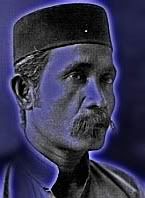Extremely Words
It is a fact well known among those who have stared at them, face to faceless, that Trengganu ghosts have especially long fingernails, panjang jjenggöng as they will tell you, and then they will end it with a final Eeeeee! plus a shoulder-shrug. The last to signal their note of aversion for having had to behold such a terrible sight. The confrontation would have taken place in the thick of night, gelak gguguk, in a distant place, jauh jjenak.
Jjengöng, gguguk, jjenak are nonce words, standing only for the occasion, never seen again outside the context or hand unheld by the adjectives that they enhance — panjang (long), gelak (dark), jauh (far). On their own they are meaningless, but with the companion adjectives, they enhance. So, dark (gelak), becomes very, very dark (gelak gguguk), long becomes very, very, long (panjang jjengöng), and dark becomes very, very dark (gelak gguguk). These are 'extremely' words.
There are many extremely words that decorate our passage of Trengganuspeak - dekat pèh, tajang landak, tupo gelenyèh, tinggi langgok, basat ttèrè — extremely near, sharp, blunt, high, poor. Basat ttèrè sunggoh lah orang hök dök tahu perkataang-perkataang ning O anök wok! Poor indeed is the person who doesn't know any of these words, O my child!
There's no discernible rule as to how these words come about. In what I've called 'ding-dong' words — warih waröh (kith and kin), sia maja (bad luck) — the rule is easier to grasp as they are mostly rhyming couplets or are joined together by a bond that's alliterative. In their togetherness they embrace all pertaining to the preceding companion word. Thus, Serba serbi, everything and anything, gguling gölèk, rolling and all the motions that result from it, lauk pauk (from standardspeak), all the dishes and everything attending. These are, needless to say, not extremely words, but indicate, merely, the variety of things or acts.
Sometimes the choice of adverb (surprisingly, it is an adverb qualifying an adjective) displays erudition, as in the Trengganuspeak gelak gelemak (pitch dark). Gelemak here is not a nonce, but a word in its own right, coming as it does from the Arabic dzulma' (darkness) as in 'laila dzulma', a very dark night.
These add colour to Trengganuspeak (any 'speak'), and colour itself gives us an array of delight: hitang llegang, very (extremely) black, kuning ssiör, very yellow, putéh selepuk, very white, mèröh mmerang, garish red, and biru hhèrang, very blue. The last one is again an inserted Arabic, hèrang being the Arabic 'hairan' (nonplussed) in the Trengganu tongue. So extremely blue that the beholder is left without powers of speech.
And they enhance taste in our talk: manis lleténg, masang pperik (ppekök), pahit llepang, tawör hhèbèr, cerör berör...sweet, sour, bitter, bland and bland again they are, all extremely.
And here I must pause lest I be accused of giving you banyök ddö'öh* to think about.
______________________
*Too much. For the origin of ddö'öh, see blogs, passim.
Labels: ding-dong words, extremely words, superlatives

